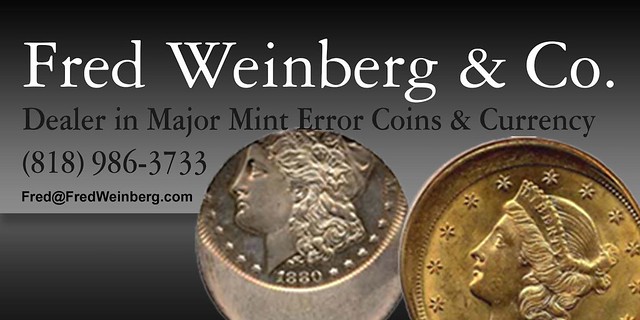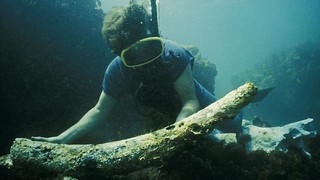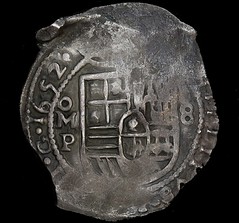
PREV ARTICLE
NEXT ARTICLE
FULL ISSUE
PREV FULL ISSUE
COINS OF THE GILT DRAGONWhile adding a coin to this week's Numismatic Nuggets I followed a link to this article about the coins of Dutch East India Company ship the Gilt Dragon which sank near Australia in 1656. It's by Andrew Crellin of Sterling & Currency in Fremantle, Western Australia. See the complete article online for tables of coin statistics. -Editor
The Gilt Dragon stands apart from all other wrecks in Australia as being the “first modern discovery of an outward-bound seventeenth century Dutch East Indiaman.” Although the wreck of the Gilt Dragon has been studied in detail since 1963, the mystery surrounding it’s survivors remains as strong as ever.
When the Dutch authorities in Batavia learned of the wreck, several attempts were made to secure the eight chests of treasure, however the search parties were not able to sight the wreck, let alone any of the survivors or the treasure. The wreck of the Gilt Dragon lived on in local legend across West Australia however, yet remained undisturbed for more than three centuries, and only came to light in 1963, when several recreational spear-fishermen stumbled upon it. The story of the period shortly following the discovery of the wreck of the Gilt Dragon is nearly as captivating as the story of the wreck itself - controversy, dynamite, bureacracy, treasure, and sadly even suicide all feature in the Gilt Dragon’s story. The Coins Recovered from the Gilt Dragon Of the approximately 20,000 coins that have been recovered, just 4,288 have been identified and are legally held in private hands. Analysis of the 4,288 coins that have been identified and are legally held in private hands yields the following information: These statistics clearly show that the most readily available coin from the wreck of the Gilt Dragon is a Spanish colonial 8 reals struck at the Mexico City Mint in Mexico. The coins recovered from the wreck of the Gilt Dragon that offer the best combination of rarity, size and visual appeal are arguably the silver 8 reals struck at the Segovia Mint - just 20 of them are known in private hands, they are the largest of the very few “milled” coins included within the wreck’s treasure. Andrew adds: I read more about the wreck of the Gilt Dragon last night - the fate of the survivors that were left behind really isn’t known: "While seven crew members from Vergulde Draak completed the voyage to Batavia in the ship’s boat, the vast majority of the survivors, including the captain, possibly never left the WA mainland after the wrecking event and their ultimate fate remains unknown, despite the VOC spending a great deal of time and effort searching for them, losing several ship’s boats and their crews in the process" (Green 1977:48–60). In some ways, they are the first Europeans to “settle” on the Australian continent - I’m always amazed that we have these incredible stories on our shores here in West Australia. We don’t have the same number or size of shipwrecks that Florida has as an example, but the stories here really are incredible. I’m at work on a booklet at present that identifies the different types of coins recovered from each shipwreck off our coast, as little has been written to date. There ain’t enough hours in the day! To read the complete article, see:  Wayne Homren, Editor The Numismatic Bibliomania Society is a non-profit organization promoting numismatic literature. See our web site at coinbooks.org. To submit items for publication in The E-Sylum, write to the Editor at this address: whomren@gmail.com To subscribe go to: https://my.binhost.com/lists/listinfo/esylum All Rights Reserved. NBS Home Page Contact the NBS webmaster 
|

